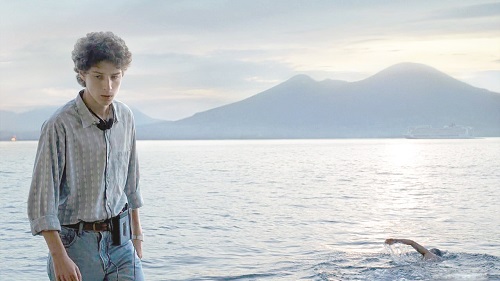Sorrentino’s Notti Magiche
TORONTO – After a despairing week which included the death of the Italia ‘90 legend Toto Schillaci, and the unceremonious sacking of AS Roma’s Daniele De Rossi, a cinematic reminisce via Sorrentino’s nostalgic frolic and coming-of-age drama “The Hand of God”, seems appropriate. In Sorrentino’s semi-autobiographical film however, an elusive and diminutive Argentine is the hero, not Toto. The two did cross paths of course, three year’s after the film’s infamous summer setting, the season Napoli won their first Scudetto – courtesy of Maradona’s magic.
“The Hand of God” epitomizes in two hours, the emotional fracas of adolescence, the distinct acerbic interactions within an Italian family and the often-chaotic nature of life on the peninsula. It’s the type of film that speaks to everyone, not through cheap platitudes or universal truths, but from the gut – in true Neapolitan fashion. The story is about perseverance, declared in an early scene as the protagonist’s father Saverio advises on his son Fabietto’s love life: “For your first time, take whatever comes. A total dog is okay. The important thing is to take it out the first time”. In football parlance, break the duck.
Fabietto, an impressionable sixteen year old who sadly lacks friends his age, spends most of his time in the company of his relatives, a rag tag group ranging from a caustic grandmother to a haughty lawyer uncle to an institutionalized aunt. Through Fabietto – who is the fictionalized representation of Director Paolo Sorrentino – the viewer is led through the condemnatory world of a young writer’s mind, as he picks out the idiosyncrasies and foibles of each relative, demarcating for his future self the more favourable traits from the least. From each of his relatives, he learns something. Lust, from an apparently lascivious aunt. Philosophy, from an uncle who adds meaning where none exists. And perseverance from a father who has an answer for everything. All of this served up with just the right dose of Southern Italian cynicism. And with every character’s misanthropic utterance, a tinge of pride emerges, like that of a soldier’s who survived war. “Humanity is dreadful, didn’t they tell you?” says a stone-faced widow neighbour speaking of her late husband’s pitfalls. Always within earshot of such fulminations, Fabietto muses on his family’s drama for what will soon become his life’s passion – filmmaking.
The film’s backdrop being the two most memorable summers in recent Neapolitan history – the 1986 World Cup and Napoli’s 1987 Scudetto winning season – perfectly echoes Fabietto’s adolescent desire to dream for bigger things. Diego Maradona, for Napoli fans was a San Gennaro miracle. “He’d never leave Barcelona for this shithole”, predicted Fabietto’s father who essentially spoke for the entire city. It was unthinkable. Unimaginable. But it happened. And if Maradona could switch from one of the Sport’s most storied clubs to a 10th place team who’d never won a domestic title, then hope springs eternal. “The Hand of God” is not only a nostalgic romp or personal story, it’s a reminder that once upon a time, we were all dreamers. Even more, we had courage. And as Fabietto’s film mentor advises him in the film, “those without courage don’t sleep with beautiful women”.
Watch “The Hand of God” on Netflix
Photos courtesy of The Apartment Pictures/Netflix
Massimo Volpe is a filmmaker and freelance writer from Toronto: he writes reviews of Italian films/content on Netflix





